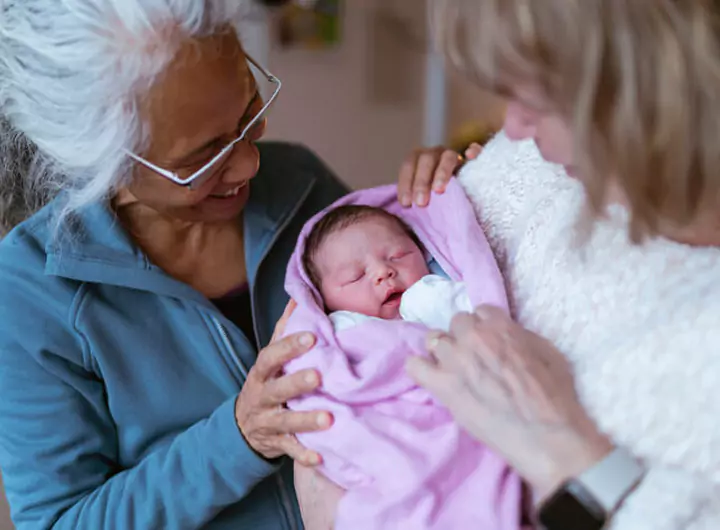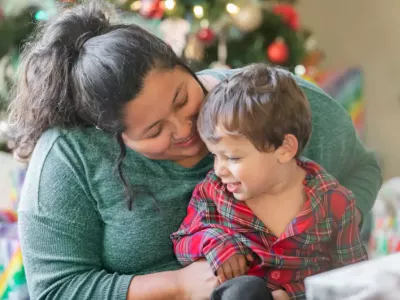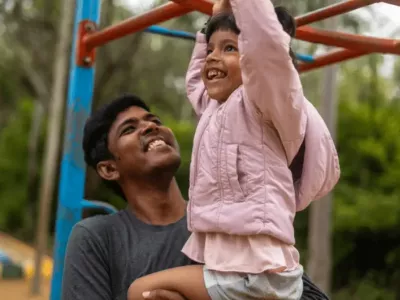Triple P helps build a caring community for new parents and their babies

This Perinatal Mental Health Week (17-23 November), parenting experts at the Triple P – Positive Parenting Program are joining voices across Australia to highlight the role of community for giving babies the best start in life and strengthening the mental health and wellbeing of new parents and carers.
Associate Professor Alina Morawska, Director of The University of Queensland’s Parenting and Family Support Centre and Triple P for Baby co-author, said becoming a parent is a big identity change and new parents can feel a mix of emotions, from joy and excitement to uncertainty and sometimes sadness or worry. Providing a community of support is critical to navigating this new journey.
“The theme of the week: ‘We’re here, a community that cares’, recognises the importance of new parents having a strong community network through family, friends, or face-to-face and online parenting communities,” Dr Morawska said.
“When parents feel supported, they’re better placed to create a positive, nurturing environment for their baby.”
According to research, an estimated 1 in every 5 women and 1 in 10 fathers or non-birth partners experiencing anxiety, depression, or both during pregnancy and/or following birth.
“Rising mortgage and rental costs, financial pressures and social isolation are exacerbating the challenges new parents and carers are already experiencing. This can leave them feeling stressed, anxious, unhappy, and tired – all risk factors that increase the likelihood of them developing mental health concerns and negatively impacting family life,” Dr Morawska said.
“The good news is that the mental health of new parents is improved – particularly for those experiencing disadvantage – when they can access evidence-based, comprehensive ‘wrap-around’ supports, such as medical, psychological, and social care, that create a holistic approach to parental wellbeing,” she said.
”Triple P Online for Baby, the free, evidence-based online program for new and expecting parents, is a crucial part of the wrap-around support making a difference to families nationwide.”
“Thanks to Australian Government funding, more than 60,0000 new families in Australia have accessed the online program, reflecting the high demand for this kind of support,” said Dr Morawska.
“It helps parents and carers not only normalise seeking help but also offers practical strategies to boost their confidence and enjoyment during the early stages of parenting.”
Top tips for new and expecting parents
Here are some practical tips from Triple P to help expecting and new parents build parental confidence and nurture the connection with their baby now and in the future:
- Have realistic expectations of yourself. It’s okay If you don't feel an immediate connection with your baby or struggle to feel it at times, lots of new parents feel the same. It doesn't mean you love your baby any less. Be kind to yourself and let the connection gradually unfold in its own time.
- Positively respond to your baby. It's not always easy to figure out what babies are trying to tell you. Having some knowledge and strategies about baby cues and signals can help you feel more confident in trying different approaches to settle them.
- Look after yourself. Taking care of yourself is the opposite of being selfish and can help you be more relaxed and positive, which can help you feel more connected to your baby. Small things like having a chat with a friend, taking a nature walk (maybe with bub in the pram), or taking a few minutes to listen to your favourite music can have a big impact.
- Connect on a physical level to build a strong bond with your baby while also releasing ‘feel good’ hormones to benefit your mental health. This can include cuddling/holding your baby, singing, talking, or reading to your baby, or taking a moment to gently gaze into their eyes and give them a warm smile.
“Triple P Online for Baby is a source of much-needed support. However, if you're a new parent or expecting a baby and you're feeling sad, anxious, or guilty and feel you may need some extra assistance, try to remember that asking for help is a sign of strength and you don’t have to navigate it alone. There is guidance and reassurance readily available within your community, be it online or in-person, such as your doctor, health professional, or a perinatal mental health organisation like the Gidget Foundation,” Dr Morawska said.
Arabella Gibson, CEO of Gidget Foundation Australia, which is commissioned by the Commonwealth to lead Perinatal Mental Health Week, said, “Perinatal Mental Health Week is an opportunity to highlight the diverse and varied experiences that parents can face and address the challenges associated with perinatal mental health. These challenges can include birth trauma, pregnancy and infant loss, parenting with a disability, issues for culturally and linguistically diverse families, as well as young parents, and dads or non-birthing partners. This year, 57 organisations have united to remind potential, expectant and new parents that support is available for them at all stages of their unique journey, and they have a community that they can turn to no matter what their experience is.”

